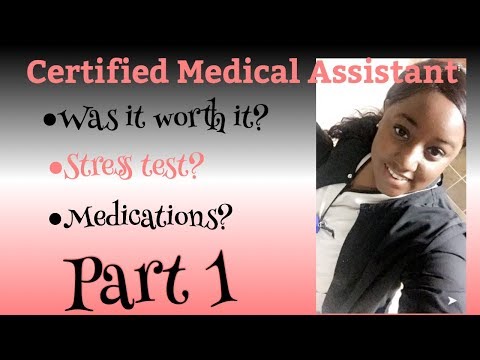Find the Right Medical Assistant Specialty Job for You
Contents
- Defining medical assistant specialties
- Exploring medical assistant job options
- Determining the best medical assistant specialty for you
- Training and education requirements for medical assistant specialties
- Certification options for medical assistant specialties
- Salary expectations for medical assistant specialties
- Job outlook for medical assistant specialties
- Pros and cons of medical assistant specialties
- Making the decision to pursue a medical assistant specialty
- Next steps for finding the right medical assistant specialty job for you
Thinking about a career as a medical assistant? Not sure what specialty is the right fit for you? This blog post will help you find the right medical assistant specialty job for you.
Checkout this video:
Defining medical assistant specialties
In the medical assistant field, there are many different types of specialties available. You may be wondering what each one entails and if it’s the right fit for you. Here is a brief overview of five popular medical assistant specialties to help you make a decision:
Allergy and immunology: In this specialty, you will work with patients who have allergies or weakened immune systems. You will need to be able to take care of these patients in a delicate way, as their conditions can be life-threatening.
Cardiology: working in this specialty, you will help patients with heart conditions. This can include everything from Heart disease to pacemaker implantation. You need to be able to handle delicate patient care and have excellent bedside manner.
Endocrinology: In this specialty, you work with patients who have hormone imbalances or problems with their metabolism. This can include diabetes, thyroid disorders, and more. You need to have excellent communication skills to explain difficult concepts to patients.
Gastroenterology: In this specialty, you will work with patients who have digestive system disorders. This can include anything from Crohn’s disease to celiac disease. You need to be able to handle delicate patient care and have excellent bedside manner.
Ophthalmology: Ophthalmology is the study of eyes and vision. In this specialty, you will work with patients who have diseases or disorders of the eye. This can include everything from cataracts to glaucoma. You need excellent bedside manner and good communication skills to explain complex concepts to patients.
Exploring medical assistant job options
There are many different types of medical assistant jobs, and the job you ultimately choose will depend on your skills, interests, and experience. Here are some common medical assistant job titles to help you get started in your search:
-Clinical medical assistant: A clinical medical assistant works directly with patients, providing hands-on care in a variety of settings, such as doctor’s offices, clinics, and hospitals.
-Administrative medical assistant: An administrative medical assistant is responsible for the behind-the-scenes work in a medical office or facility, such as scheduling appointments and managing patient records.
-Billing and coding specialist: A billing and coding specialist is responsible for coding patient diagnoses and procedures for insurance reimbursement.
-Medical scribe: A medical scribe documents patient encounters in real time, allowing physicians to focus on patient care.
Which type of medical assistant job is right for you? The best way to find out is to explore the different options and talk to current Medical assistants about their experiences.
Determining the best medical assistant specialty for you
There are many different medical assistant specialty areas to choose from, and it can be difficult to decide which one is right for you. Different areas have different requirements and provide different levels of pay and opportunity. It’s important to do your research before you make a decision, and here are some things to keep in mind as you explore your options.
First, think about what kind of environment you’d like to work in. Do you want to be in a hospital, a private practice, or something else? Each setting has its own advantages and disadvantages, so it’s important to know what you’re looking for.
Second, consider what kind of patients you want to work with. Some medical assistant specialty areas focus on working with certain populations, such as pediatrics or geriatrics. Others allow you to work with a variety of patients.
Third, think about what type of tasks you want to perform. Some medical assistant specialty areas focus on clinical tasks, such as taking medical histories and performing physical exams. Others focus on administrative tasks, such as scheduling appointments and billing insurance companies.
Once you’ve considered these factors, you should have a better idea of which medical assistant specialty is right for you. Once you’ve made your decision, it’s time to start researching specific job openings in your area so you can begin your new career!
Training and education requirements for medical assistant specialties
There are several different medical assistant specialties, and each one has its own unique training and education requirements. Here is a brief overview of some of the most popular medical assistant specialties:
Certified Medical Assistant (CMA): CMAs must complete an accredited medical assistant program and pass a national certification exam.
Registered Medical Assistant (RMA): RMAs must complete an accredited medical assistant program and pass a national registration examination.
Medical Assistant-Certified (MA-C): MACs must complete an accredited medical assistant program and pass a national certification examination. They may also be required to complete a state-approved MA-C exam.
Medical Assistant-Registered (MA-R): MARs must complete an accredited medical assistant program and pass a national registration examination. They may also be required to complete a state-approved MA-R exam.
Certification options for medical assistant specialties
Medical assistant specialties jobs are found in many different medical settings, from hospitals and clinics to private physician practices. No matter where you work, you will be responsible for a variety of clerical duties, as well as providing direct patient care. In order to qualify for these positions, you will need to have completed a medical assistant training program and passed the certification exam.
There are different types of certification available for Medical Assistants depending on the specialty you are interested in. The most common specialties are listed below, along with information on the certification exams and requirements.
-Certified Medical Assistant (CMA): The CMA certification is offered by the American Association of Medical Assistants (AAMA) and is recognized nationwide. To qualify for this certification, you must complete an accredited medical assistant training program and pass the CMA exam.
–Registered Medical Assistant (RMA): The RMA credential is offered by the American Medical Technologists (AMT) and is also recognized nationwide. To qualify for this credential, you must complete an accredited medical assistant training program and pass the RMA exam.
-National Certified Medical Assistant (NCMA): The NCMA credential is offered by the National Healthcareer Association (NHA) and is recognized nationwide. To qualify for this credential, you must complete an accredited medical assistant training program and pass the NCMA exam.
Salary expectations for medical assistant specialties
If you’re considering a career as a medical assistant, you may be wondering about the best way to maximize your earnings potential. One way to do this is to choose a specialty area within the medical assistant field. Here’s a look at some of the most popular medical assistant specialties and what you can expect in terms of salary:
Allergy/immunology: Allergy/immunology medical assistants work with patients who have allergies or who have immune system disorders. They may also work with patients who are undergoing treatment for cancer or other diseases. Salary expectations for this specialty area are typically higher than for other medical assistant specialties, due to the specialized nature of the work.
Anesthesiology: Anesthesiology medical assistants work with patients who are going to be or who are currently undergoing surgery. They help prepare patients for surgery and monitoring them during and after surgery. Anesthesiology medical assistants typically earn salaries on the higher end of the spectrum.
Cardiology: Cardiology medical assistants work with patients who have heart conditions or who are at risk for developing heart conditions. They may also work with patients who have had heart surgery or who are scheduled to have heart surgery. Cardiology medical assistants typically earn salaries on the higher end of the spectrum.
Dermatology: Dermatology medical assistants work with patients who have skin conditions or who are at risk for developing skin conditions. They may also work with patients who are scheduled to have dermatological surgery. Dermatology medical assistants typically earn salaries on the higher end of the spectrum.
Job outlook for medical assistant specialties
The job outlook for medical assistants is expected to grow much faster than the average for all occupations through 2026, according to the U.S. Bureau of Labor Statistics (BLS). The demand for medical assistants will continue to grow as the population ages and requires more medical care.
There are many different types of medical assistant specialties, so it’s important to choose the one that’s right for you. Some of the most popular medical assistant specialties include:
-Cardiology (working with patients with heart conditions)
-Dermatology (working with skin conditions)
-Endocrinology (working with hormone disorders)
-Gastroenterology (working with digestive disorders)
-Geriatrics (working with older adults)
-Gynecology (working with female reproductive health)
-Nephrology (working with kidney disorders)
Whichever specialty you choose, you can be sure that you’ll be in high demand!
Pros and cons of medical assistant specialties
There are a number of medical assistant specialties to choose from, each with its own set of pros and cons. Here is a brief overview of some of the most popular medical assistant specialties to help you decide which one is right for you:
Administrative medical assistants are responsible for the administrative tasks associated with running a medical office, such as scheduling appointments, maintaining records, and billing patients. Pros: This is a good entry-level position for those interested in pursuing a career in healthcare administration. Cons: The work can be extremely fast-paced and stressful at times.
Clinical medical assistants are responsible for providing direct patient care, such as taking vital signs, administering injections, and performing basic lab tests. Pros: This is a great way to get experience working directly with patients. Cons: The work can be physically demanding and emotionally challenging at times.
Transcriptionist medical assistants transcribe physician dictation into patient records. Pros: This is a good option for those who want to work from home or have a flexible schedule. Cons: The work can be repetitive and tedious at times.
Medical billing and coding medical assistants are responsible for coding patient diagnoses and procedures for insurance reimbursement. Pros: This is a good option for those who want to work from home or have a flexible schedule. Cons: The work can be repetitive and detail-oriented at times.
Making the decision to pursue a medical assistant specialty
Making the decision to pursue a medical assistant specialty is a big one. There are many different specialties to choose from, and each has its own set of responsibilities, required skills, and salary range. It’s important to choose a specialty that’s a good fit for your skillset and interests, as well as one that will offer you the chance to earn the salary you want.
Here are some things to consider when choosing a medical assistant specialty:
-What are your strengths and weaknesses?
-What kind of personality do you have?
-What are your interests?
-Do you want to work in a specific type of facility?
-Do you want to work with a specific population of patients?
-What is your desired salary range?
Once you’ve considered all of these factors, you can begin narrowing down your choices and researching individual specialties in more depth. To get started, here is an overview of five popular medical assistant specialties:
Cardiology: Medical assistants in this specialty work in cardiology offices and clinics, assisting cardiologists with patient care. Responsibilities may include taking patient histories and vital signs, scheduling appointments, preparing patients for exams, and providing education on lifestyle changes and medications. Cardiology medical assistants must be able to handle stressful situations and have excellent customer service skills. Many positions also require certification in CPR.
Dermatology: Dermatology medical assistants work in dermatologists’ offices and clinics, assisting with patient care. Responsibilities include greeting patients, schedule appointments, taking patient histories, performing basic skin tests, preparing patients for procedures, providing post-procedure care instructions, and answering patient questions. Dermatology medical assistants must have excellent customer service skills and be able to handle potentially stressful situations calmly. They must also be comfortable working with blood and other bodily fluids. Some positions may require certification in CPR or phlebotomy.
Endocrinology: Endocrinology medical assistants work in endocrinologists’ offices and clinics, assisting with patient care. Responsibilities may include greeting patients, scheduling appointments, taking patient histories, performing basic lab tests, preparing patients for exams or procedures educating patients on lifestyle changes or medications.. Endocrinology medical assistants must be able to handle potentially stressful situations calmly and have excellent customer service skills
Next steps for finding the right medical assistant specialty job for you
The best way to find the right medical assistant specialty job for you is to first assess your skills and interests. What do you enjoy doing? What are you good at? Once you have a good understanding of your strengths, you can start looking for medical assistant jobs that match your skillset.
There are many different medical assistant specialty jobs to choose from, so it’s important to take the time to research each one before making a decision. Once you’ve narrowed down your options, take the time to read job descriptions and learn more about the duties and responsibilities of each position. This will help you make sure that the medical assistant job you choose is the right fit for you.







